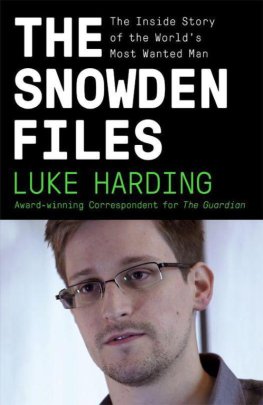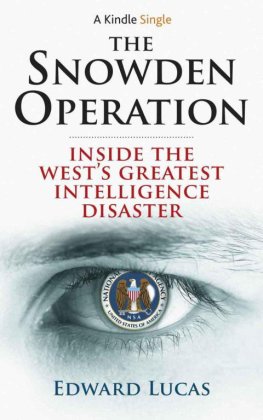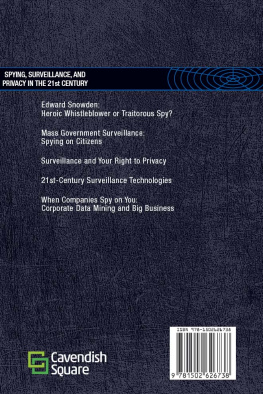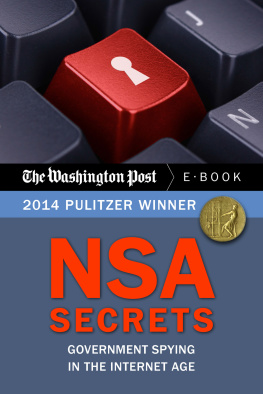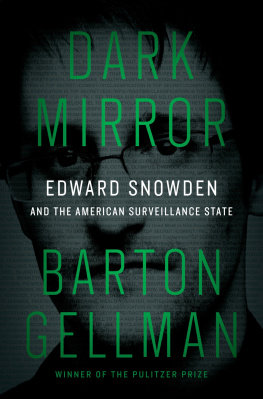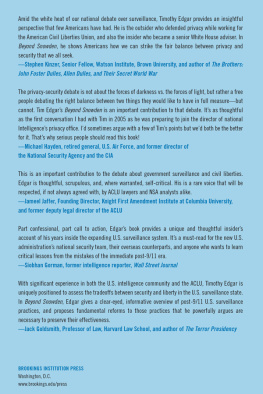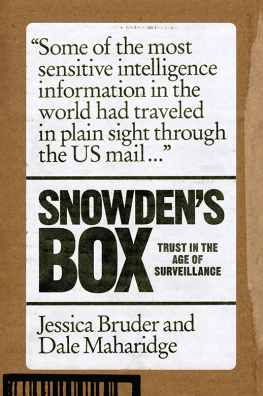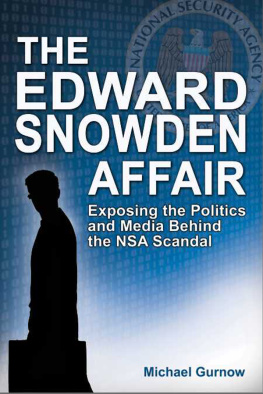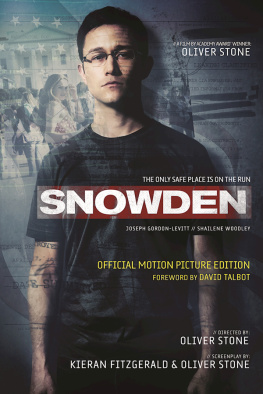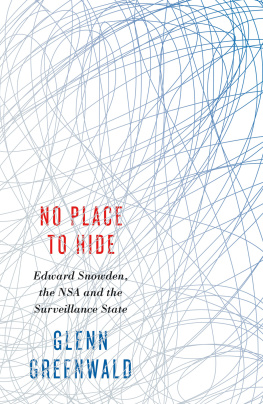THE
SNOWDEN
READER
THE
SNOWDEN
READER
EDITED BY
DAVID P. FIDLER
FOREWORD BY SUMIT GANGULY

This book is a publication of
Indiana University Press
Office of Scholarly Publishing
Herman B Wells Library 350
1320 East 10th Street
Bloomington, Indiana 47405 USA
www.iupress.indiana.edu
2015 by Indiana University Press
All rights reserved
No part of this book may be reproduced or utilized in any form or by any means, electronic or mechanical, including photocopying and recording, or by any information storage and retrieval system, without permission in writing from the publisher. The Association of American University Presses Resolution on Permissions constitutes the only exception to this prohibition.
The paper used in this publication meets the minimum requirements of the American National Standard for Information SciencesPermanence of Paper for Printed Library Materials, ANSI Z39.481992.
Manufactured in the United States of America
Cataloging is available from the Library of Congress.
ISBN 978-0-253-01731-4 (cloth)
ISBN 978-0-253-01737-6 (paperback)
ISBN 978-0-253-01738-3 (ebook)
1 2 3 4 5 20 19 18 17 16 15
To my students, whose generation has so much at stake
when national security dangers, innovative technologies,
and commitment to civil liberties converge.
When the people of America reflect that they are now called upon to decide a question, which, in its consequences, must prove one of the most important that ever engaged their attention, the propriety of their taking a very comprehensive, as well as serious, view of it, will be evident.
The Federalist Papers, No. 2
CONTENTS
/ Sumit Ganguly |
/ David P. Fidler |
/ Nick Cullather |
/ Fred H. Cate |
/ Lee H. Hamilton |
/ David P. Fidler |
/ William E. Scheuerman |
Hero or Villain?
Persecuting a Defender of Human Rights v. Prosecuting a Criminal Suspect |
Rubber Stamp or Robust Tribunal?
The Foreign Intelligence Surveillance Court |
Made in the USA?
NSA Surveillance and U.S. Technology Companies |
Friend and Foe?
U.S. Espionage against Other Countries |
A Secure and Reliable Cyberspace?
The NSA, Encryption, and Exploits |
Norms of Responsible Behavior in Cyberspace?
U.S. Cyber Operations |
Worse than the U.S.?
Surveillance by the UKs Government Communications Headquarters |
Foreword
Public disclosures of classified information have long played a role in U.S. national security politics, raising questions about secrecy in a democracy, the propriety of government actions, and the protection of civil rights. Until recent events, perhaps the most famous episode involved Daniel Ellsberg, a civilian Pentagon analyst, who released in April 1971 nearly seven thousand pages of a classified study called History of U.S. Decision-Making Process on Viet Nam Policy to the New York Times and the Washington Post. After the Times began publishing excerpts from what became known as the Pentagon Papers, the Nixon administration attempted to prevent the newspapers from publishing more classified information. The Supreme Court, in a striking decision, held that the U.S. government failed to satisfy the First Amendments requirements for imposing a prior restraint on freedom of speech. The governments prosecution of Ellsberg for violating the Espionage Act also failed because evidence emerged of the governments clandestine efforts to discredit him with documents obtained from burgling his psychiatrists safe.
In June 2013, another historic episode involving disclosure of classified information began when the Guardian, a British newspaper, began publishing stories about secret documents provided to it by Edward J. Snowden, who had worked as a private contractor for the National Security Agency (NSA). To much consternation in national security circles, these stories revealed that Snowden had made available to journalists a vast trove of material pertaining to the NSAs surveillance and espionage activities. Snowdens actions embarrassed the U.S. government, raised fears about damage to U.S. national security, sparked controversies about the possible abuse of civil liberties in the United States, and angered citizens and leaders of foreign countries, including U.S. allies, who discovered the NSA had access to their communications.
Snowdens release of classified documents was of momentous significance because of the political, legal, and ethical issues it raised in the United States and around the world. Given the magnitude of the disclosures and their impact, on September 6, 2013, the Center on American and Global Security at Indiana University organized a panel of leading IU faculty to examine the historical, legal, policy, and ethical dimensions of Snowdens actions. At the suggestion of Rebecca Tolen of Indiana University Press and under the editorship of David P. Fidler, the panel presentations were revised, expanded, and updated as essays reflecting on Snowdens disclosures and their aftermath. These essays form , a selection of primary documents disclosed by Snowden, released by the U.S. government or other affected actors, or produced in the wake of the controversies during the first year of this affair. The Snowden Reader combines critical analysis of major issues Snowdens disclosures generated with primary sources at the heart of the controversies. It provides expert perspectives and access to documents that have become, in various ways, historic.
The contributions in range across the spectrum of political, legal, and ethical matters affected by Snowdens actions. In the introduction, David P. Fidler sets the stage by reviewing the Snowden disclosures and analyzing how the disclosures generated pressure on fault lines in U.S. national security politics, precipitating a potential historic shift in U.S. policy and law on foreign intelligence.
In Security and Liberty: The Imaginary Balance, Nick Cullather focuses on the frequent use of the metaphor of balance between liberty and security in Snowden-related debates and provides a historical perspective on the idea of striking a balance between these objectives. What many people believe is a concept rooted in the republics founding is actually of more recent vintage, dating from the crafting of new U.S. national security architecture, including the NSA, in the early Cold War period. Cullather observes that the balance metaphor arose in the development of a system of classified information and security clearances. According to Cullather, this system has produced a country divided between those who know and cannot speak, and those who can speak but do not knowa division at the heart of the politics stirred up by Snowden. This division produced oversight failures within the community of people with security clearances, making leakers an indispensable but criminalized link, mediating a vexed relationship between the public and the cleared.
Fred H. Cate analyzes five issues in Edward Snowden and the NSA: Law, Policy, and Politicsthe scope of the NSAs legal authority for collecting telephone metadata in the United States, problems with the trustworthiness of U.S. officials, the hypocrisy of the U.S. government concerning cyber espionage, the weakening of cyber security by U.S. activities, and the impact on privacy of U.S. surveillance programs. His critique of the U.S. governments interpretation of applicable law, surveillance policies, and responses to Snowden is withering. He roots his criticisms in principles he believes are central to the nations politics, including the Fourth Amendment and the importance of ensuring that interpretations of law not remain secret from the American people.
Next page

